In Alabama and across the country, water heaters are an essential component of every home. They provide the comfort of hot water for showers, dishwashing, laundry, and more. Yet, traditional water heaters can often be a source of frustration. They’re prone to running out of hot water at the most inconvenient times, and their bulky size takes up valuable space in your home. They can also be energy guzzlers, contributing to high utility bills. This article aims to shed light on a superior alternative: the tankless water heater. Switching to a tankless solution offers numerous benefits such as endless hot water, improved reliability, and greater energy efficiency. Let’s explore why upgrading to a tankless water heater might be the best decision for your Alabama home.
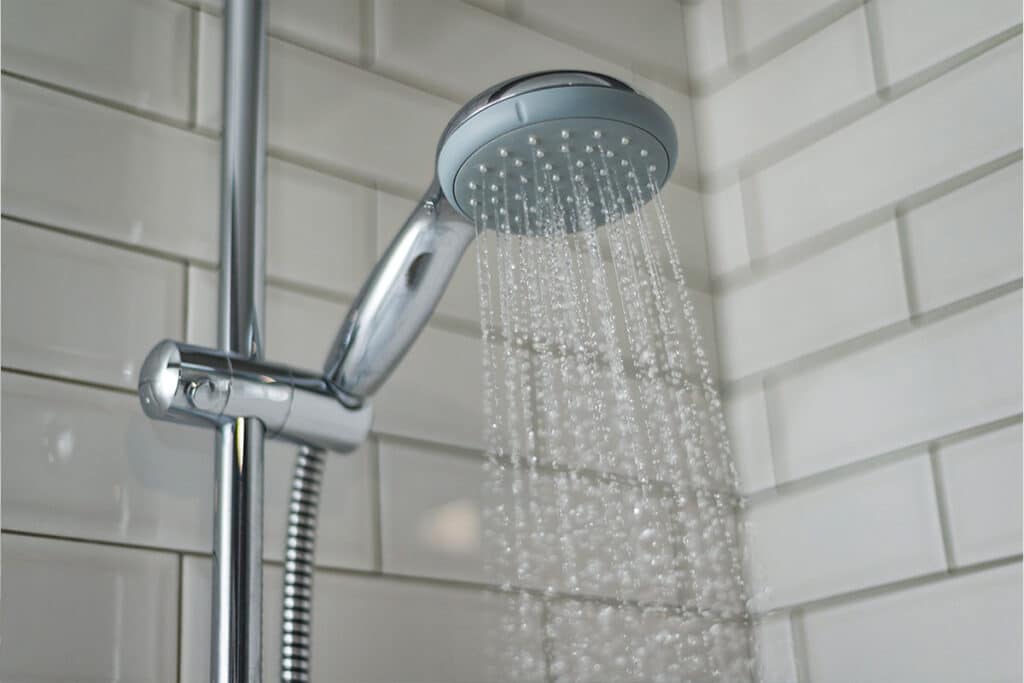
Understanding Traditional Water Heaters
Traditional water heaters operate on a simple principle. They continuously heat a large tank of water (usually 30-50 gallons) to a set temperature, ensuring a reservoir of hot water is always available. When you turn on a hot water tap, heated water from the tank is supplied through the pipes. As the hot water is used, cold water enters the tank to replace it. The heating element then works to raise the temperature of the new water.
However, this system is not without its flaws. First, there’s the problem of capacity. If multiple hot water appliances are used simultaneously or in quick succession, the tank can be emptied faster than it refills and reheats, causing you to “run out” of hot water. Second, traditional water heaters are susceptible to leaks, primarily due to the constant stress of heating and cooling, which can lead to substantial water damage. Lastly, they are not particularly energy efficient. As they maintain the temperature of the entire tank around the clock, a significant amount of heat is lost to the surroundings, a phenomenon known as “standby heat loss.” This results in elevated energy consumption and consequently, higher utility bills.
When a traditional water heater fails, especially in homes where the unit is located in the attic, the challenges multiply. The attic’s confined space and the weight of a water heater make removal a hazardous task, particularly on steep attic stairs. The process could potentially cause injury to those undertaking the task, and the difficulty of maneuvering the bulky unit can potentially lead to accidental damage to the ceiling and walls below. In Alabama, where many homes have their water heaters located in these lofty spaces, the risk of significant home damage is a real concern. If the unit were to leak or burst, the water can seep through the ceiling and walls, leading to costly repairs and replacements. The gravity of these issues underscores the need for a more convenient and reliable solution like a tankless water heater.
What is a Tankless Water Heater?
A tankless water heater, as the name suggests, does not store water for heating. Instead, it heats water directly and on demand as it flows through the unit. When you turn on a hot water tap, cold water travels into the heater. An electric element or gas burner inside the heater then heats the water instantly. Because the water is heated directly, a tankless water heater can deliver a constant supply of hot water. You don’t need to wait for a storage tank to fill up with enough hot water, eliminating the issue of running out of hot water midway through a shower or a dishwashing session.
The key difference between tankless and traditional water heaters lies in their operation. Traditional heaters preheat a large amount of water and maintain it at a set temperature, using energy constantly to compensate for standby heat loss. In contrast, tankless heaters use energy only when you need hot water, making them much more energy-efficient. This on-demand heating mechanism removes the need for a bulky storage tank, freeing up valuable space in your home. Additionally, because water is heated as it’s needed, the risk of leaks associated with traditional tank-heating systems is significantly reduced. In the next section, we will delve deeper into the various advantages this modern heating solution offers homeowners in Alabama, and why it might be time for you to make the switch.
Benefits of Tankless Water Heaters
Endless Hot Water
Tankless water heaters are designed to provide an uninterrupted supply of hot water, a feature that sets them apart from their traditional counterparts. This is possible because of their on-demand heating mechanism. When you turn on a hot water tap or start an appliance that uses hot water, cold water travels into the tankless heater. An electric element or gas burner inside the heater then heats the water instantly. As long as there’s a supply of cold water and energy, hot water will be continually produced, avoiding the frustrating experience of the hot water running out midway through a shower or a dishwashing session.
This benefit is particularly valuable in scenarios where there’s a high demand for hot water. For instance, families with multiple members taking showers in quick succession or running multiple appliances simultaneously, such as the dishwasher and washing machine, can benefit enormously from a tankless water heater. The same goes for those who enjoy long, hot showers or have a large soaking tub that requires a substantial amount of hot water. With a tankless water heater, the hot water supply is not limited by a tank’s capacity but by the flow rate—making it a reliable solution for homes with high hot water demand.
Enhanced Reliability
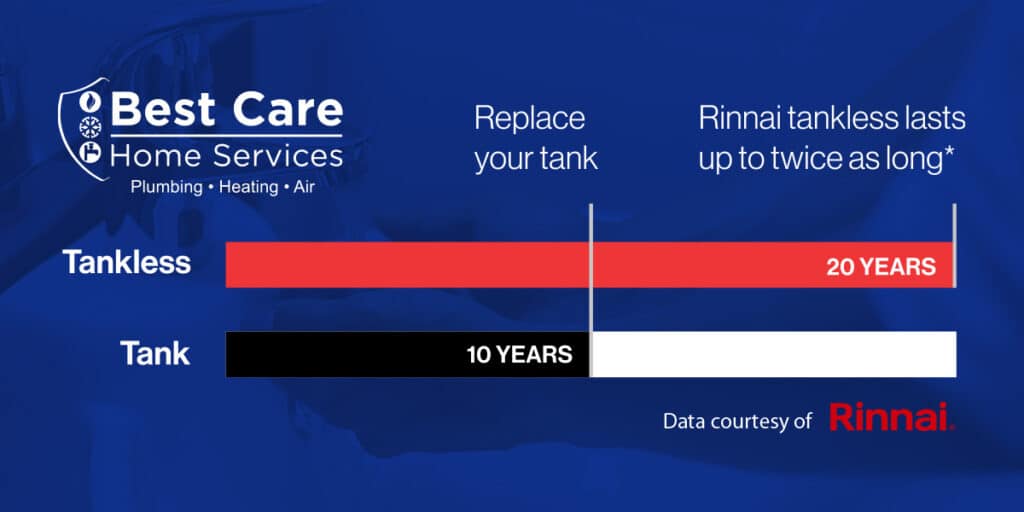
Decreased Likelihood of Leaks and Failures
Tankless water heaters are known for their superior reliability and durability compared to traditional water heaters. The key lies in their innovative structural design, which eliminates the common issues associated with large water storage tanks. Traditional heaters, due to the constant heating and cooling process, experience frequent expansion and contraction. Over time, this can gradually weaken the tank’s structure, leading to leaks or even catastrophic failures. However, tankless heaters operate differently. By not storing water, they eliminate the risk of tank leaks and ruptures altogether. This innovative design ensures long-lasting performance and peace of mind for homeowners. So, when it comes to choosing a water heating solution, consider the many benefits and added security that tankless water heaters bring to your home.
Longer Lifespan
Additionally, tankless water heaters generally have a longer lifespan than their traditional counterparts. Traditional water heaters typically last 10 to 15 years, while tankless units can last more than 20 years with proper maintenance[1]. This extended lifespan can be attributed to their advanced design and construction, which minimizes the risk of rust and corrosion. By not holding water continuously, tankless water heaters eliminate the stagnant water that is prone to these damaging effects. As a result, they offer a cost-effective and durable solution for long-term use, providing homeowners with reliable and efficient hot water for years to come.
[1]: Consumer Reports: Pros and Cons of Tankless Water HeatersEnergy Efficiency
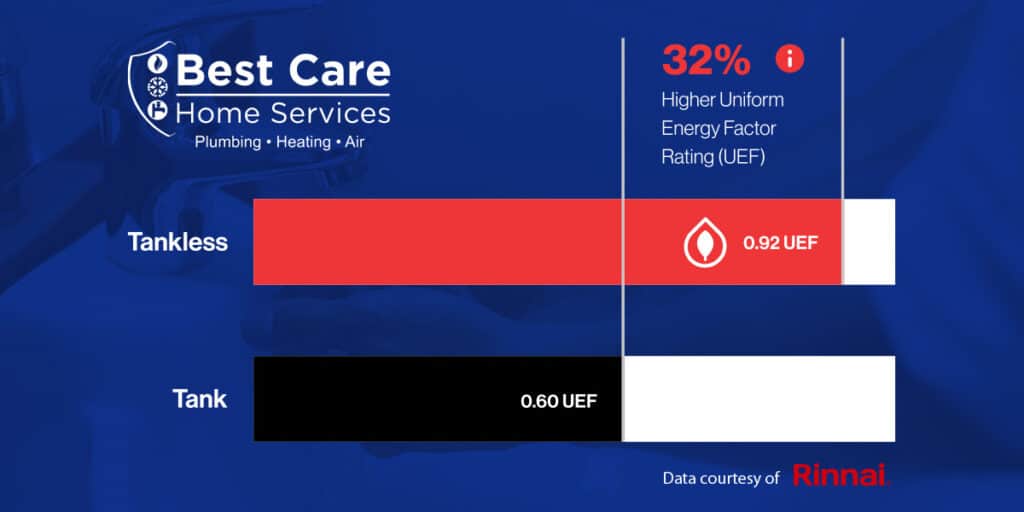
Tankless water heaters are substantially more energy-efficient than traditional models. According to Energy.gov, for homes that use 41 gallons or less of hot water daily, tankless water heaters can be 24%–34% more energy efficient than conventional storage tank water heaters[2]. For homes that use a lot of hot water—around 86 gallons per day—you can still expect to see 8%–14% energy savings[2]. Over time, these energy savings translate into significant cost savings on utility bills.
The U.S. Department of Energy estimates that, on average, a tankless water heater can save a home $100 per year[2]. When you consider the longer lifespan of a tankless water heater, this adds up to substantial savings over the life of the unit.
In contrast to traditional heaters which constantly heat and reheat water, tankless water heaters only heat water when it’s needed. Therefore, standby energy loss is significantly reduced, leading to lower energy consumption and, consequently, lower energy costs. By upgrading to a tankless water heater, homeowners not only benefit from continuous hot water but also from lower energy bills, making it an economical and eco-friendly choice for modern households.
[2]: Energy.gov: Tankless or Demand-Type Water Heaters Energy EfficiencyInstallation and Maintenance
Installation of Tankless Water Heaters
The process of installing a tankless water heater is significantly different from that of a traditional water heater. Traditional heaters, due to their bulky size, are often confined to basements or utility rooms. In contrast, tankless units, with their compact size, provide more flexibility in installation locations, including closets, crawl spaces, and even on the outside walls of your home. They can be strategically installed near the most frequently used water outlets to reduce delay in hot water delivery. While the upfront costs of installing a tankless water heater can be higher due to the need for electrical outlets, upgraded gas pipes, or a new ventilation system, the long-term energy savings often offset this initial investment[3].
Maintenance of Tankless Water Heaters
Maintaining a tankless water heater is crucial to ensure its longevity and high-efficiency operation. While these units are designed for durability, regular maintenance can help prevent scale buildup which can impact efficiency over time. Routine maintenance includes flushing the unit to remove any mineral deposits, checking for leaks, inspecting the venting system, and ensuring the burner and flame rod are in good condition[4]. It’s recommended to have your tankless water heater serviced by a professional annually, depending on water hardness and usage.
Regular maintenance not only ensures consistent performance but also safeguards the unit’s warranty. Ignoring maintenance can lead to a decrease in efficiency, an increase in operating costs, and potentially void the manufacturer’s warranty. By investing in regular maintenance, homeowners can enjoy optimal performance and significant energy savings from their tankless water heater for many years.
[3]: Home Advisor: The Cost to Install a Tankless Water Heater [4]: Rinnai: Tankless Water Heater MaintenanceEnvironmental Impact
Switching to tankless water heaters also offers significant environmental benefits. These units contribute to lower greenhouse gas emissions due to their higher energy efficiency. Traditional heaters continuously heat stored water, resulting in substantial standby energy loss[5]. In contrast, tankless water heaters only heat water on demand, drastically reducing energy consumption and, consequently, the carbon footprint.
Moreover, the extended lifespan of tankless water heaters means less frequent replacement, which reduces the demand for manufacturing, transportation, and disposal of units, all of which have environmental impacts. Also, many tankless water heaters are designed with replaceable parts, further extending their lifespan and reducing waste.
Finally, the use of tankless water heaters encourages water conservation. As these units provide hot water almost instantaneously, water wastage waiting for the shower or faucet to warm up is minimized[6]. By upgrading to a tankless water heater, homeowners can enjoy the comfort of efficient water heating while contributing to a greener and more sustainable environment.
[5]: EPA: Energy Efficiency and Greenhouse Gas Emissions [6]: Treehugger: Water Conservation and Tankless Water HeatersCost Considerations
Initial Costs and Long-Term Savings
While the initial cost of purchasing and installing a tankless water heater may be higher than the traditional models, the long-term benefits outweigh these upfront expenses. The purchase cost of a tankless water heater can range from $1,000 to $3,000[7], varying based on the model, size, and brand. The installation cost is also comparatively higher due to the need for specialized fittings, upgraded gas lines, or electrical installations.
Despite these costs, the long-term savings from a tankless water heater are significant. As they are 24%–34% more energy efficient for homes that use 41 gallons or less of hot water daily[2], homeowners can expect to save around $100 per year on energy bills[2]. Given that tankless water heaters have a lifespan of 20 years or more, nearly twice that of traditional models, the energy savings over the life of the unit can amount to $2,000 or more[8].
Additionally, potential savings from reduced water waste and less frequent replacements contribute to the overall return on investment. When factoring in these economic benefits, along with the added comfort and convenience of continuous hot water supply, the case for upgrading to a tankless water heater becomes compelling.
[7]: Fixr: Cost to Install a Tankless Water Heater [8]: Consumer Reports: Are Tankless Water Heaters Worth The Investment?The Verdict on Upgrading to Tankless Water Heaters
In summary, upgrading to a tankless water heater offers numerous advantages. It ensures a continuous supply of hot water, provides energy efficiency, and offers long-term cost savings. Tankless systems are compact, enabling strategic installation, and require less frequent replacements due to their extended lifespan. Also, they encourage water conservation and have a lower environmental impact. Initial costs can be higher, but the long-term energy savings, and the comfort and convenience they offer, make them a worthy investment.
At Best Care, we believe in providing the best for your home and the environment. If you’re considering upgrading to a tankless water heater in Huntsville, we’re here to help with expert advice and professional installation services. You can trust us for your plumbing needs. To get started, call us at 256-937-7889 or complete the form on our Contact Us page. Embrace the future of efficient and sustainable water heating with us. Upgrade to a tankless water heater today!
Recent Articles
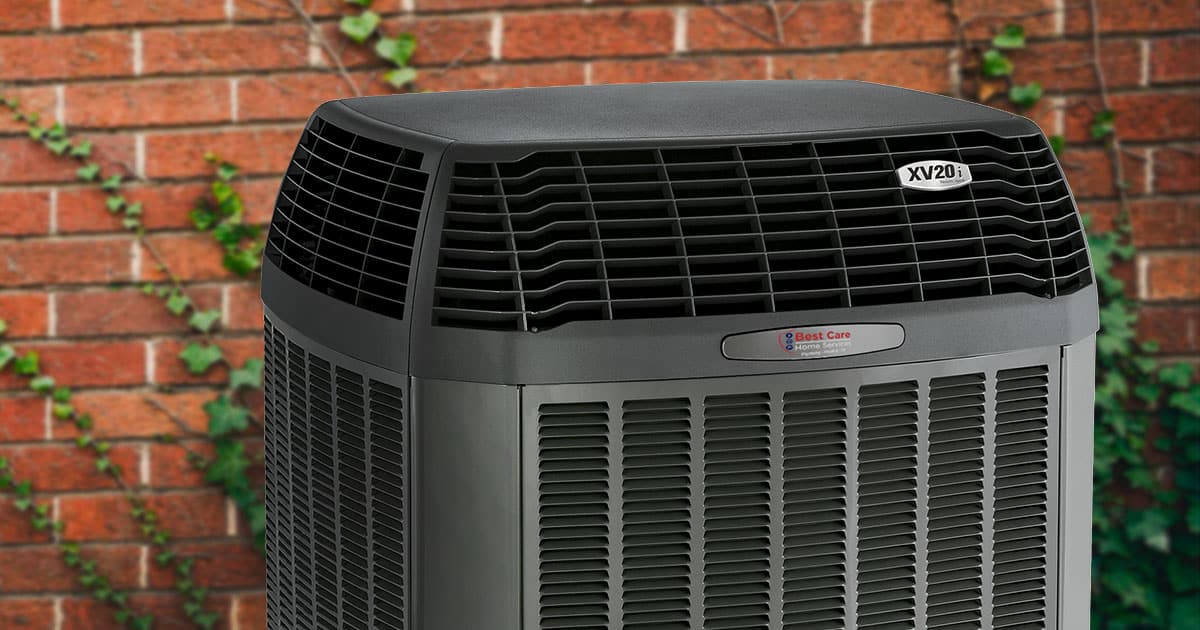
Guide to Air Conditioning: Huntsville AC Repair & Installation Options
Huntsville AC Repair & Installation Options The humid climate of Huntsville, Alabama, often means that a…
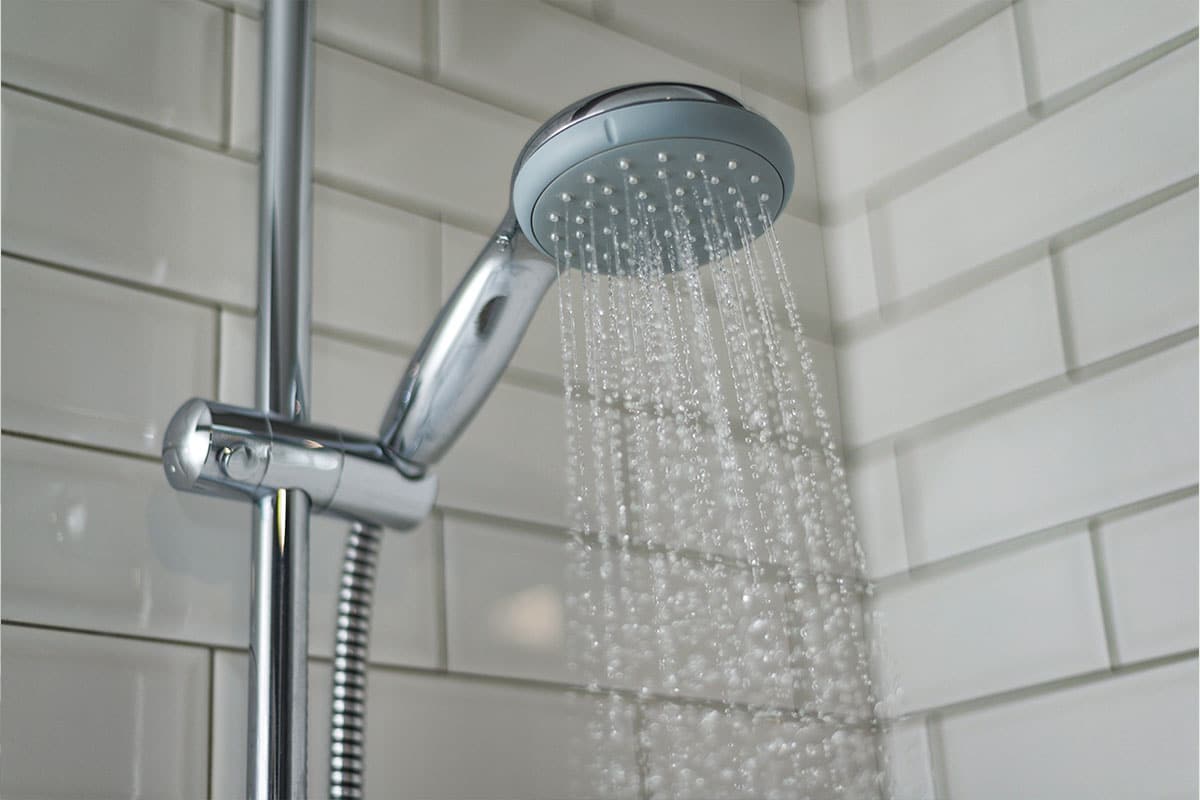
Advantages of Upgrading to a Tankless Water Heater
In Alabama and across the country, water heaters are an essential component of every home. They…

Breathe Easy in Huntsville: Elevating Home Comfort with Regular Air Filter Changes
Elevating Home Comfort with Regular Air Filter Changes In the vibrant city of Huntsville, ensuring your…
